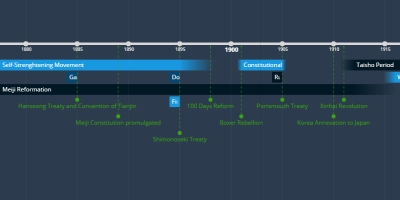Taiping Rebellion (jan 1, 1850 – jan 1, 1864)
Description:
Background: After there the first Opium war, there was significant social unrest. Peasants faced major natural disasters which disrupted agricultural production. The population in China had rapidly increased which caused the per capital arable land to decrease-- farmers were no longer ability to make a living off their land and that, compounded with the burden from taxation due to the inflated price of silver forced many peasants to sell their lands and become tenant farmers. Meanwhile, the bureaucracy managed by the mandarins with the help of literati continued to be corrupt and the government had little interest in the people's welfare. China's military weakness exposed by the opium wars encouraged domestic rebellions by Chinese who were increasingly dissatisfied with the Manchu government. The rebellion took place in Southern China, which was geographically further away from Beijing but also had economic reasons for unrest since trade had shifted away from the South to Shanghai.Development:
The Taiping Rebellion was led by Hung Xiuchuan. The area which was under control of Xiuchuan's supporters was under Christian theocracy and originally, the West was neutral towards the rebels because of their religious similarity. Socially, the Taiping kingdom was structured based on class equality and included social welfare to support the people. The Taiping rebellion however was defeated by Zeng Guofan, backed by the Qing government, with the help of Li Hongzhang. Strategically, Hung wasn't a strong enough leader to maintain the rebellion and the Taiping failed to gain potential Western support which could have helped guarantee its success.
Implications:
The Taiping rebellion would later inspire future rebellions, including Sun Yat-Sen's revolution to establish the Republic of China. Additionally, the rebellion would led to a political power transfer to the Han regional powers because the Qing government was unable to maintain stability through central power, forcing it to hand over power to provincial governments.
Added to timeline:
Date:
jan 1, 1850
jan 1, 1864
~ 14 years
